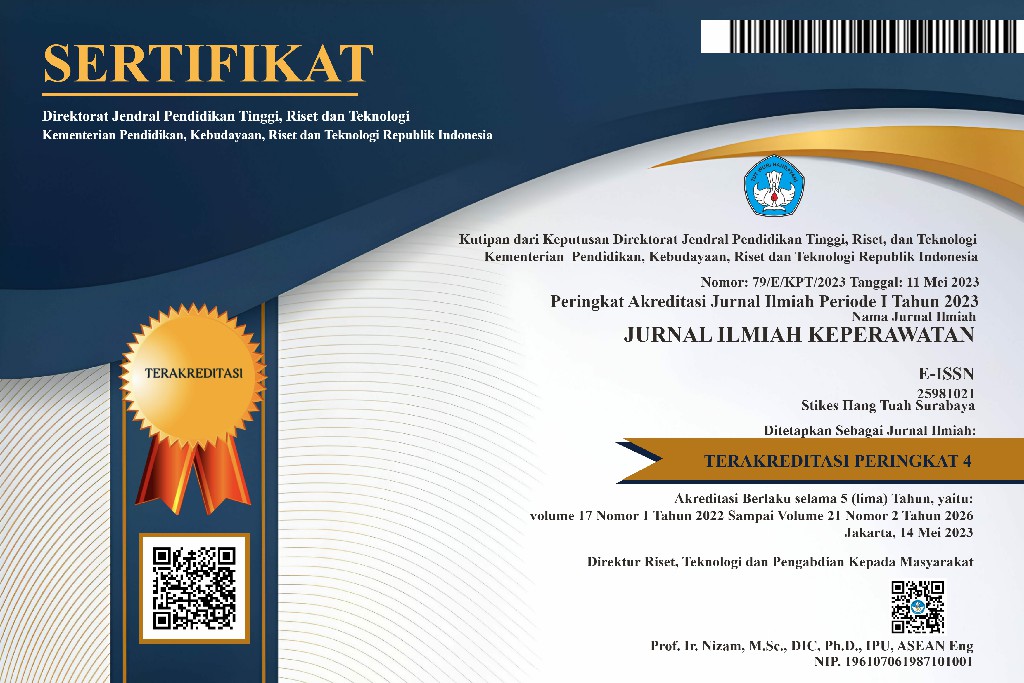Family Functioning of Schizophrenia Patients in the Outpatient Unit of Menur Mental Hospital, East Java Province
DOI:
https://doi.org/10.30643/jiksht.v18i1.242Keywords:
Family Functioning, Caregiver, FamilyAbstract
The phenomenon of a family caregiver caring for family members with schizophrenia requires a balance of family functions. Imbalances in family functioning can affect caregivers in caring for schizophrenic patients. The aim of this study was to describe the family function of schizophrenia patients. Methods: The research design used probability sampling with simple random sampling. Data collection using FAD (Family Assessment Device) questionnaires. Using a sample of families caring for family members experiencing schizophrenia that met the inclusion and exclusion criteria with 160 respondents. Results: The result of the study was the family function criteria were found in good family function criteria of as many as 86 people (53.8%). Conclusion: The implication of this study was family function among schizophrenia patients is needed to decrease the family burden.
Downloads
References
Alexander, J. F., & Robbins, M. (2019). Functional family therapy Encyclopedia of Couple and Family Therapy (pp. 1232-1240): Springer. https://doi.org/10.1007/978-3-319-49425-8_161
Anggraini, I. R., & Novitasari, L. (2021). Literature Review; The Importance of Family Center Care to Increase Child Resilience During Covid 19 Pandemic. Jurnal Ilmiah Keperawatan, 16(2), 111-119. doi:https://doi.org/10.30643/jiksht.v16i2.142
Bansal, V., & Chatterjee, I. (2021). Role of neurotransmitters in schizophrenia: a comprehensive study. Kuwait Journal of Science, 48(2). https://doi.org/10.48129/kjs.v48i2.9264
Caqueo-Urízar, A., Rus-Calafell, M., Urzúa, A., Escudero, J., & Gutiérrez-Maldonado, J. (2015). The role of family therapy in the management of schizophrenia: challenges and solutions. Neuropsychiatric disease and treatment, 11, 145. doi:https://doi.org/10.2147%2FNDT.S51331
Cheng, H. Y., Chair, S. Y., & Chau, J. P. C. (2018). Effectiveness of a strength-oriented psychoeducation on caregiving competence, problem-solving abilities, psychosocial outcomes and physical health among family caregiver of stroke survivors: A randomised controlled trial. International Journal of Nursing Studies, 87, 84-93. doi:10.1016/j.ijnurstu.2018.07.005
Chi, N.-C., Demiris, G., Lewis, F. M., Walker, A. J., & Langer, S. L. (2016). Behavioral and educational interventions to support family caregivers in end-of-life care: a systematic review. American Journal of Hospice and Palliative Medicine®, 33(9), 894-908. doi:https://doi.org/10.1177/1049909115593938
Cho, J. (2019). Schizophrenia & Other Psychotic Disorders. Police Response to Mental Health in Canada, 50.
Cohen, S. A., Sabik, N. J., Cook, S. K., Azzoli, A. B., & Mendez-Luck, C. A. (2019). Differences within differences: Gender inequalities in caregiving intensity vary by race and ethnicity in informal caregivers. Journal of Cross-Cultural Gerontology, 34(3), 245-263. doi:https://doi.org/10.1007/s10823-019-09381-9
Downloads
Published
Issue
Section
License
Authors retain copyright and grant the journal right of first publication with the work simultaneously licensed under a Creative Commons Attribution-ShareAlike 4.0 License that allows others to share the work with an acknowledgment of the work's authorship and initial publication in this journal.












